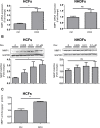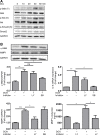Doxorubicin induces trans-differentiation and MMP1 expression in cardiac fibroblasts via cell death-independent pathways
- PMID: 31513610
- PMCID: PMC6742217
- DOI: 10.1371/journal.pone.0221940
Doxorubicin induces trans-differentiation and MMP1 expression in cardiac fibroblasts via cell death-independent pathways
Abstract
Although doxorubicin (DOX)-induced cardiomyopathy causes lethal heart failure (HF), no early detection or effective treatment methods are available. The principal mechanisms of cardiotoxicity are considered to involve oxidative stress and apoptosis of cardiomyocytes. However, the effect of DOX on cardiac fibroblasts at non-lethal concentrations remains unknown. The aim of this study was to investigate the direct effect of doxorubicin on the activation of cardiac fibroblasts independent of cell death pathways. We first found that DOX induced α-SMA expression (marker of trans-differentiation) at a low concentration range, which did not inhibit cell viability. DOX also increased MMP1, IL-6, TGF-β and collagen expression in human cardiac fibroblasts (HCFs). In addition, DOX promoted Akt and Smad phosphorylation. A Smad inhibitor prevented DOX-induced α-SMA and IL-6 protein expression. An PI3K inhibitor also prevented MMP1 mRNA expression in HCFs. These findings suggest that DOX directly induces fibrotic changes in HCFs via cell death-independent pathways. Furthermore, we confirmed that these responses are organ- and species-specific for HCFs based on experiments using different types of human and murine fibroblast cell lines. These results suggest potentially new mechanisms of DOX-induced cardiotoxicity from the viewpoint of fibrotic changes in cardiac fibroblasts.
Conflict of interest statement
The authors have declared that no competing interests exist.
Figures






Similar articles
-
[Doxorubicin directly induced fibrotic change of cardiac fibroblasts].Nihon Yakurigaku Zasshi. 2021;156(3):146-151. doi: 10.1254/fpj.20101. Nihon Yakurigaku Zasshi. 2021. PMID: 33952842 Japanese.
-
Loss of Mrp1 Potentiates Doxorubicin-Induced Cytotoxicity in Neonatal Mouse Cardiomyocytes and Cardiac Fibroblasts.Toxicol Sci. 2016 May;151(1):44-56. doi: 10.1093/toxsci/kfw021. Epub 2016 Jan 27. Toxicol Sci. 2016. PMID: 26822305 Free PMC article.
-
A novel compound DT-010 protects against doxorubicin-induced cardiotoxicity in zebrafish and H9c2 cells by inhibiting reactive oxygen species-mediated apoptotic and autophagic pathways.Eur J Pharmacol. 2018 Feb 5;820:86-96. doi: 10.1016/j.ejphar.2017.12.021. Epub 2017 Dec 9. Eur J Pharmacol. 2018. PMID: 29229534
-
Protective transcriptional mechanisms in cardiomyocytes and cardiac fibroblasts.J Mol Cell Cardiol. 2019 Jul;132:1-12. doi: 10.1016/j.yjmcc.2019.04.023. Epub 2019 Apr 28. J Mol Cell Cardiol. 2019. PMID: 31042488 Free PMC article. Review.
-
Gene expression phenotypes of oncogenic signaling pathways.Cell Cycle. 2003 Sep-Oct;2(5):415-7. Cell Cycle. 2003. PMID: 12963829 Review. No abstract available.
Cited by
-
Doxorubicin-induced modulation of TGF-β signaling cascade in mouse fibroblasts: insights into cardiotoxicity mechanisms.Sci Rep. 2023 Nov 2;13(1):18944. doi: 10.1038/s41598-023-46216-7. Sci Rep. 2023. PMID: 37919370 Free PMC article.
-
Sunitinib and Imatinib Display Differential Cardiotoxicity in Adult Rat Cardiac Fibroblasts That Involves a Role for Calcium/Calmodulin Dependent Protein Kinase II.Front Cardiovasc Med. 2021 Feb 1;7:630480. doi: 10.3389/fcvm.2020.630480. eCollection 2020. Front Cardiovasc Med. 2021. PMID: 33598481 Free PMC article.
-
Anthracycline-Related Heart Failure: Certain Knowledge and Open Questions : Where Do we Stand with Chemotherapyinduced Cardiotoxicity?Curr Heart Fail Rep. 2020 Dec;17(6):357-364. doi: 10.1007/s11897-020-00489-5. Epub 2020 Sep 23. Curr Heart Fail Rep. 2020. PMID: 32964378 Free PMC article. Review.
-
Prevention and treatment of anthracycline-induced cardiotoxicity: A bibliometric analysis of the years 2000-2023.Heliyon. 2024 Apr 21;10(9):e29926. doi: 10.1016/j.heliyon.2024.e29926. eCollection 2024 May 15. Heliyon. 2024. PMID: 38698971 Free PMC article.
-
Role of non-cardiomyocytes in anticancer drug-induced cardiotoxicity: A systematic review.iScience. 2022 Oct 8;25(11):105283. doi: 10.1016/j.isci.2022.105283. eCollection 2022 Nov 18. iScience. 2022. PMID: 36300001 Free PMC article. Review.
References
-
- Siegel R, DeSantis C, Virgo K, Stein K, Mariotto A, Smith T, et al. Cancer treatment and survivorship statistics, 2012. CA: a cancer journal for clinicians. 2012;62(4):220–41. - PubMed
-
- Zamorano JL, Lancellotti P, Rodriguez Munoz D, Aboyans V, Asteggiano R, Galderisi M, et al. 2016 ESC Position Paper on cancer treatments and cardiovascular toxicity developed under the auspices of the ESC Committee for Practice Guidelines: The Task Force for cancer treatments and cardiovascular toxicity of the European Society of Cardiology (ESC). Eur Heart J. 2016;37(36):2768–801. 10.1093/eurheartj/ehw211 - DOI - PubMed
-
- Ewer MS, Ewer SM. Cardiotoxicity of anticancer treatments. Nat Rev Cardiol. 2015;12(11):620. - PubMed
Publication types
MeSH terms
Substances
LinkOut - more resources
Full Text Sources
Research Materials
Miscellaneous

